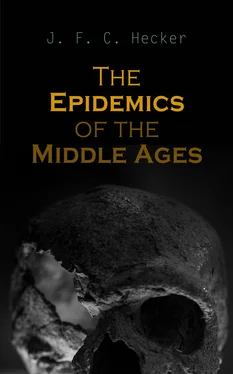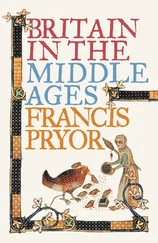The appointment of a forty days’ detention, whence quarantines derive their name, was not dictated by caprice, but probably had a medical origin, which is derivable in part from the doctrine of critical days; for the fortieth day, according to the most ancient notions, has been always regarded as the last of ardent diseases, and the limit of separation between these and those which are chronic. It was the custom to subject lying-in women for forty days to a more exact superintendence. There was a good deal also said in medical works of forty day epochs in the formation of the fœtus, not to mention that the alchymists expected more durable revolutions in forty days, which period they called the philosophical month.
This period being generally held to prevail in natural processes, it appeared reasonable to assume, and legally to establish it, as that required for the development of latent principles of contagion, since public regulations cannot dispense with decisions of this kind, even though they should not be wholly justified by the nature of the case. Great stress has likewise been laid on theological and legal grounds, which were certainly of greater weight in the fifteenth century than in more modern times199.
On this matter, however, we cannot decide, since our only object here is to point out the origin of a political means of protection against a disease, which has been the greatest impediment to civilization within the memory of man; a means, that, like Jenner’s vaccine, after the small-pox had ravaged Europe for twelve hundred years, has diminished the check which mortality puts on the progress of civilization, and thus given to the life and manners of the nations of this part of the world a new direction, the result of which we cannot foretell.
Table of Contents
Table of Contents
Das alte Geisslerlied
NACH MASSMANN’S AUSGABE VON HERRN PROFESSOR LACHMANN MIT DER HANDSCHRIFT VERGLICHEN.
Sve siner sele wille pleghen
De sal gelden unde weder geuen
So wert siner sele raed
Des help uns leue herre goed
Nu tredet here we botsen wille5
Vle wi io de hetsen helle
Lucifer is en bose geselle
Sven her hauet
Mit peke he en lauet
Datz vle wi ef wir hauen sin10
Des help uns maria koninghin
Das wir dines kindes hulde win
Jesus crist de wart ge vanghen
An en cruce wart he ge hanghen
Dat cruce wart des blodes rod15
Wer klaghen sin marter unde sin dod
Sunder war mide wilt tu mi lonen
Dre negele unde en dornet crone
Das cruce vrone en sper en stich
Sunder datz leyd ich dor dich20
Was wltu nu liden dor mich
So rope wir herre mit luden done
Unsen denst den nem to lone
Be hode uns vor der helle nod
Des bidde wi dich dor dinen dod25
Dor god vor gete wi unse blot
Dat is uns tho den suden guot
Maria muoter koninginghe
Dor dines leuen kindes minne
Al unse nod si dir ghe klaghet30
Des help uns moter maghet reyne.
De erde beuet och kleuen de steyne
Lebe hertze du salt weyne
Wir wenen trene mit den oghen
Unde hebben des so guden louen35
Mit unsen sinnen unde mit hertzen
Dor uns leyd crist vil manighen smertzen
Nu slaed w sere
Dor cristus ere.
Dor god nu latet de sunde mere40
Dor god nu latet de sunde varen
Se wil sich god ouer uns en barmen
Maria stund in grotzen noden
Do se ire leue kint sa doden
En svert dor ire sele snet45
Sunder dat la di wesen led
In korter vrist
God tornich ist
Jesus wart gelauet mid gallen
Des sole wi an en cruce vallen50
Er heuet uch mit uwen armen
Dat sic god ouer uns en barme
Jesus dorch dine namen dry
Nu make uns hir van sunde vry
Jesus dor dine wnden rod55
Be hod uns vor den gehen dod
Dat he sende sinen geist
Und uns dat kortelike leist
De vrowe unde man ir e tobreken
Dat wil god selven an en wreken60
Sveuel pik und och de galle
Dat gutet de duuel in se alle
Vor war sint se des duuels spot
Dor vor behode uns herre god
De e de ist en reyne leuen65
De had uns god selven gheuen
Ich rade uch vrowen unde mannen
Dor god gy solen houard annen
Des biddet uch de arme sele
Dorch god nu latet houard mere70
Dor god nu latet houard varen
So wil sich god ouer uns en barmen
Cristus rep in hemelrike
Sinen engelen al gelike
De cristenheit wil mi ent wichen75
Des wil lan och se vor gaen
Marie bat ire kint so sere
Leue kint la se di boten
Dat wil ich sceppen dat se moten
Bekeren sich.80
Des bidde ich dich
Gi logenere
Gy meynen ed sverer
Gi bichten reyne und lan de sunde uch ruwen
So wil sich god in uch vor nuwen85
Owe du arme wokerere
Du bringest en lod up en punt
Dat senket din an der helle grunt
Ir morder und ir straten rouere
Ir sint dem leuen gode un mere90
Ir ne wilt uch ouer nemende barmen
Des sin gy eweliken vor loren
Were dusse bote nicht ge worden
De cristenheit wer gar vorsunden
De leyde duuel had se ge bunden95
Maria had lost unsen bant
Sunder ich saghe di leue mere
Sunte peter is portenere
Wende dich an en he letset dich in
He bringhet dich vor de koninghin100
Leue herre sunte Michahel
Du bist en plegher aller sel
Be hode uns vor der helle nod
Dat do dor dines sceppers dod.
The Ancient Song of the Flagellants.
ACCORDING TO MASSMANN’S EDITION COMPARED WITH THE MS. BY PROFESSOR LACHMANN.
( Translation. )
Whoe’er to save his soul is fain,
Must pay and render back again.
His safety so shall he consult:
Help us, good Lord, to this result.
Ye that repent your crimes, draw nigh.5
From the burning hell we fly,
From Satan’s wicked company.
Whom he leads
With pitch he feeds.
If we be wise we this shall flee.10
Maria! Queen! we trust in thee,
To move thy Son to sympathy.
Jesus Christ was captive led,
And to the cross was riveted.
The cross was reddened with his gore15
And we his martyrdom deplore.
“Sinner, canst thou to me atone.
Three pointed nails, a thorny crown,
The holy cross, a spear, a wound,
These are the cruel pangs I found.20
What wilt thou, sinner, bear for me?”
Lord, with loud voice we answer thee,
Accept our service in return,
And save us lest in hell we burn.
We, through thy death, to thee have sued.25
For God in heaven we shed our blood:
This for our sins will work to good.
Blessed Maria! Mother! Queen!
Through thy loved Son’s redeeming mean
Be all our wants to thee portrayed.30
Aid us, Mother! spotless maid!
Trembles the earth, the rocks are rent200,
Fond heart of mine, thou must relent.
Tears from our sorrowing eyes we weep;
Therefore so firm our faith we keep35
With all our hearts—with all our senses.
Christ bore his pangs for our offences.
Ply well the scourge for Jesus’ sake,
And God through Christ your sins shall take.
For love of God abandon sin,40
To mend your vicious lives begin,
So shall we his mercy win.
Direful was Maria’s pain
When she beheld her dear One slain.
Pierced was her soul as with a dart:45
Sinner, let this affect thy heart.
The time draws near
When God in anger shall appear.
Jesus was refreshed with gall:
Prostrate crosswise let us fall,50
Then with uplifted arms arise,
That God with us may sympathize.
Jesus, by thy titles three201,
From our bondage set us free.
Читать дальше










